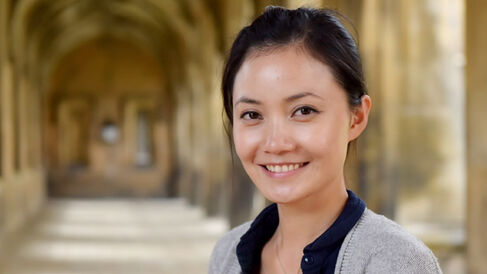
We are very pleased to announce that Dr Qian Wu is to be awarded the Biochemical Society's Early Career Research Award (Signalling Category) in 2019.
In 2007, after completing her undergraduate degree at the University of Bristol, Qian joined Professor Sir Tom Blundell's laboratory in our Department, first as a PhD student and then as a postdoctoral research associate on a Wellcome Trust Programme Grant and Investigator Award.
Qian's research focuses on understanding the functional mechanisms of the human DNA damage response and repair pathways, and identifying potential targets for future drug discovery. By combining different methods, her research explores three major properties of this complicated signalling network:
- Spatial architecture of individual and protein complexes;
- Temporal arrangement of these protein complexes;
- Regulation of protein-protein interactions through post-translational modification.
Qian has made significant contributions to the field by characterising the structure, function and assembly of various key protein complexes in the human Non-Homologous End Joining (NHEJ) pathway for repairing DNA double-strand breaks; the most toxic DNA damage type in our cells. She has also expanded her research to understanding the structure and regulation of the assembly of BRCA1 protein complexes in DNA damage response and repair signalling.
Speaking about her award, Qian said: "It is a great honour as an early career researcher to have my research recognised by the Biochemical Society Award Committee. I could not have achieved this without the strong support from my mentor since my PhD, Professor Sir Tom Blundell, and all my wonderful colleagues in the Department of Biochemistry. I am really looking forward to take the encouragement from this award to initiate my own independent research and to continue enjoying the fun from doing science."
Looking ahead, in 2017 Qian was awarded a very competitive University Academic Fellowship from the University of Leeds, which will allow her to start her own group in The Astbury Centre for Structural and Molecular Biology, University of Leeds, in September 2018.
The Biochemical Society works to promote the molecular biosciences; facilitating the sharing of expertise, supporting the advancement of biochemistry and molecular biology and raising awareness of their importance in addressing societal grand challenges. Each year the Biochemical Society makes a series of prestigious awards that recognise excellence and achievement in both specific and general fields of science. Their Early Career Research Awards recognise the impact of work carried out by early career scientists who have produced international quality research, demonstrating ambitions and aspirations consistent with the potential to achieve world-leading status.
